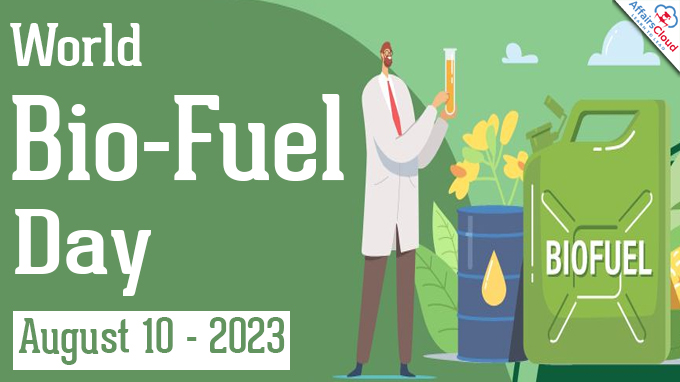
- The day also honours Rudolf Diesel, a French-German Inventor, who invented the Diesel Engine in 1892.
- The day also tries to highlight the various efforts taken by the Government to promote the use of biofuel for the sustainable development of the planet.
Background:
The Ministry of Petroleum and Natural Gas(MoPNG) initiated the observance of World Biofuel Day in India in 2015.
Why August 10?
10th August marks the day on which German inventor and mechanical engineer Sir Rudolf Christian Karl Diesel for the first time successfully ran the Diesel engine with peanut oil in 1893.
What are Biofuels?
i.Unlike other renewable energy sources, biomass can be converted directly into liquid fuels, called “biofuels”
ii.Bio-fuels are environment-friendly fuels that can be produced using biological materials like agricultural waste, trees, crops, algae, or even grass.
iii.They are cost-effective and can be stored in either liquid or gaseous form.
iv.Unlike fossil fuels, biofuels are sustainable, renewable, and biodegradable in nature.
v.These renewable fuels reduce carbon emissions by up to 90%, establishing them as an essential component towards a journey of a greener world.
Types of Biofuels:
At present, 2 most common types of biofuels are ethanol and biodiesel.
1.Ethanol:
i.Ethanol (CH3CH2OH) is a renewable fuel that can be made from various plant materials, collectively known as “biomass.”
ii.Most of the fuel ethanol produced around the world is made by fermenting the sugar in the starches of grains such as corn, sorghum, and barley, and the sugar in sugar cane and sugar beets.
2.Bio-Diesel:
i.It is a liquid fuel produced from renewable sources, such as new and used vegetable oils and animal fats, or recycled cooking grease.
ii.It is a cleaner-burning replacement for petroleum-based diesel fuel and is nontoxic and biodegradable.
Bio-Fuel in India:
India is the third-largest primary energy consumer in the world after China and the United States of America (USA).
- India’s Ministry of Petroleum and Natural Gas published its “National Policy on Biofuels” in 2018, and further amended it in June 2022. It replaced the previous “National Policy on Biofuels” promulgated in 2009 through the Ministry of New and Renewable Energy.
- An accelerated national E-20 (20% bioethanol blending) mandate from 2030 to 2025, aims to increase the capacity of ethanol production in India from 7 billion liters (BL) in 2021 to 15 BL in 2025.
Supportive Programs:
i.In addition to natural gas, an initiative called “Sustainable Alternative Towards Affordable Transportation” (SATAT) has been taken up to extract economic value from bio-mass waste in the form of Compressed BioGas (CBG) and bio-manure.
ii.Pradhan Mantri JI-VAN Yojana for providing Viability Gap Funding (VGF), financial support to Integrated Second Generation (2G) Bioethanol Projects in 2 phases. Phase-I (2018-19 to 2022-23) and Phase-II (2020-21 to 2023-24).
Recent related News:
According to the data released by the Petroleum Planning and Analysis Cell (PPAC), the MoPNG increased the Administered Price Mechanism (APM) domestic natural gas price for May 2023 to more than 4% MoM (month-over-month) to US$8.27 per mBtu (million British Thermal Units) on Gross Calorific Value (GCV) basis from US$7.92 per mBtu in April 2023.